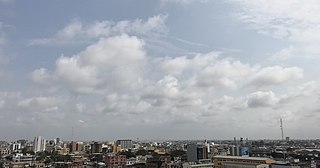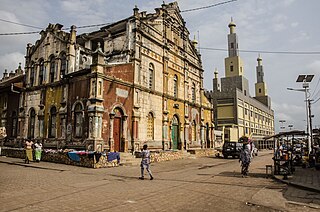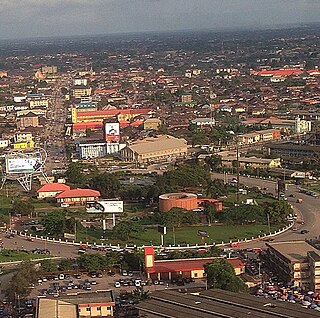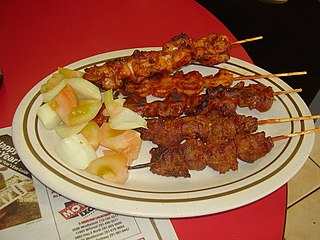People with the surname
- Flora Suya, Malawian actress
Suya is a West African shish kebab dish.
Suya may also refer to:

Benin, officially the Republic of Benin, and formerly Dahomey, is a country in West Africa. It is bordered by Togo to the west, Nigeria to the east, Burkina Faso to the north-west, and Niger to the north-east. The majority of its population lives on the southern coastline of the Bight of Benin, part of the Gulf of Guinea in the northernmost tropical portion of the Atlantic Ocean. The capital is Porto-Novo, and the seat of government is in Cotonou, the most populous city and economic capital. Benin covers an area of 114,763 square kilometres (44,310 sq mi) and its population in 2021 was estimated to be approximately 13 million. It is a tropical nation, dependent on agriculture, and is an exporter of palm oil and cotton. Some employment and income arise from subsistence farming.
A ewe is a female sheep.

Cotonou is a city in Benin. Its official population count was 761,137 inhabitants in 2006; however, some estimates indicate its population to be as high as 2.4 million.

Porto-Novo, also known as Hogbonu and Ajashe, is the capital of Benin. The commune covers an area of 110 square kilometres (42 sq mi) and as of 2002 had a population of 223,552 people.
Rb or RB may stand for:

Benin City is the capital and largest city of Edo State, Nigeria. It is the fourth-largest city in Nigeria according to the 2006 census, after Lagos, Kano, and Ibadan, with a population estimate of 1,841,000 as of 2022. It is situated approximately 40 kilometres (25 mi) north of the Benin River and 320 kilometres (200 mi) by road east of Lagos. Benin City is the centre of Nigeria's rubber industry, and oil production is also a significant industry.
Edo or EDO may refer to:

The culture of Nigeria is shaped by Nigeria's multiple ethnic groups. The country has 527 languages, seven of which are extinct. Nigeria also has over 1150 dialects and ethnic groups. The three largest ethnic groups are the Hausas that are predominantly in the north, the Yorubas who predominate in the southwest, and the Igbos in the southeast. There are many other ethnic groups with sizeable populations across the different parts of the country. The Kanuri people are located in the northeast part of Nigeria, the Tiv people of north central and the Efik-Ibibio are in the south south. The Bini people are most frequent in the region between Yorubaland and Igboland.
Zou or ZOU may refer to:

Suya or tsire is traditional smoked spiced meat skewer which originates from Northern Nigeria, Hausa Land and is a popular food item across West Africa. Suya is a big part of Hausa culture and food and is historically prepared and made by Hausa men 'Mai nama'. Suya is generally made with skewered beef, ram, or chicken. Innards such as kidney, liver and tripe are also used. The thinly sliced meat is marinated in various spices, which include traditional Hausa dehydrated peanut cookie called 'kwulikwuli', salt, vegetable oil and other spices and flavorings, and then barbecued. There are many variation of Suya in traditional Hausa cooking, but the most popular being suya. Suya is traditionally served with an extra helpings of dried pepper mixed, traditional hausa spices and sliced onions. It is also traditionally served in Hausa culture with a side serving of Hausa Masa. Halal meat preparation methods are normally used, especially in the northern parts of Nigeria where it originates as is customary with traditional Hausa foods, where the suspicion of nonconformity to Muslim dietary prohibitions in Suya preparation has been known to cause riots. A dried version of Suya is called Kilishi. It can be eaten with Masa, Kosai, Garri or Ogi.
Benin is a former French colony in western Africa. French is the official language, and is usually used in literature, along with indigenous languages. Folk stories and feminist works hold high significance in Benin literature.
The Yudjá or Juruna are an Indigenous people of Brazil. They were formerly the major tribe along the Xingu River, but are now divided into two groups, a westernized northern group near Altamira, Para near the big bend of the Xingu and a more conservative group in the Xingu Indigenous Park at the headwaters of the Xingu in Mato Grosso. The southern group lives in two villages located near the mouth of the Maritsauá-Mitau River. They fish and raise crops, such as manioc.
The Suyá, self-denomination Kisêdjê, are indigenous people in Brazil, at the headwaters of the Xingu River.
Suyá music is the music of the Suyá people, a tribe of about 150 people who live on the Suyá-Miçu River and are native to Mato Grosso, Brazil. Their houses are set up in a circle around the village square, where the majority of their ceremonies take place. Other buildings include a men's meeting house where there is almost always singing. Speech and hearing are highly valued in the social behavior of the tribe. The Suyá Indians symbolize their importance with body decorations that include ear and lip disks. In 1980, ethnomusicologist Anthony Seeger interpreted this body ornamentation as an emphasis on orality and listening as a principal means of perception, transmission, comprehension, and expression of fundamental values.
The Anii or Basila language is spoken in Benin, and central eastern Togo and central eastern Ghana. It is part of the geographic group of Ghana Togo Mountain languages of the Kwa branch of Niger–Congo.
Suya is a town and arrondissement in the Borgou Department of Benin. It is an administrative division under the jurisdiction of the commune of Nikki. According to the population census conducted by the Institut National de la Statistique Benin on February 15, 2002, the arrondissement had a total population of 5353.

Kyinkyinga or Cincinga, is a grilled meat skewer or kebab that is common and popular in West Africa and is related to the Suya kebab. Kyinkyinga is a Ghanaian Hausa dish popularised by traders in the Zango areas of town and cities, and has since becoming popular among other Ghanaians. It is hence very similar to or synonymous with the suya kebab in Nigeria and Niger, also known as suya, tsinga, cinga, cicinga, cincinga, tsire agashi, cacanga or tankora in the Hausa language.
Daroukpara is a town in the Suya arrondissement in the Borgou Department of Benin. It is an administrative division under the jurisdiction of the commune of Nikki. According to the population census in 2013, the village had a total population of 839.
Soumarou is a town in the Suya arrondissement in the Borgou Department of Benin. It is an administrative division under the jurisdiction of the commune of Nikki. According to the population census in 2013, the village had a total population of 1,215.
Ganchon, also known as Ganson, is a town in the Suya arrondissement in the Borgou Department of Benin. It is an administrative division under the jurisdiction of the commune of Nikki. According to the population census in 2013, the village had a total population of 1,593.